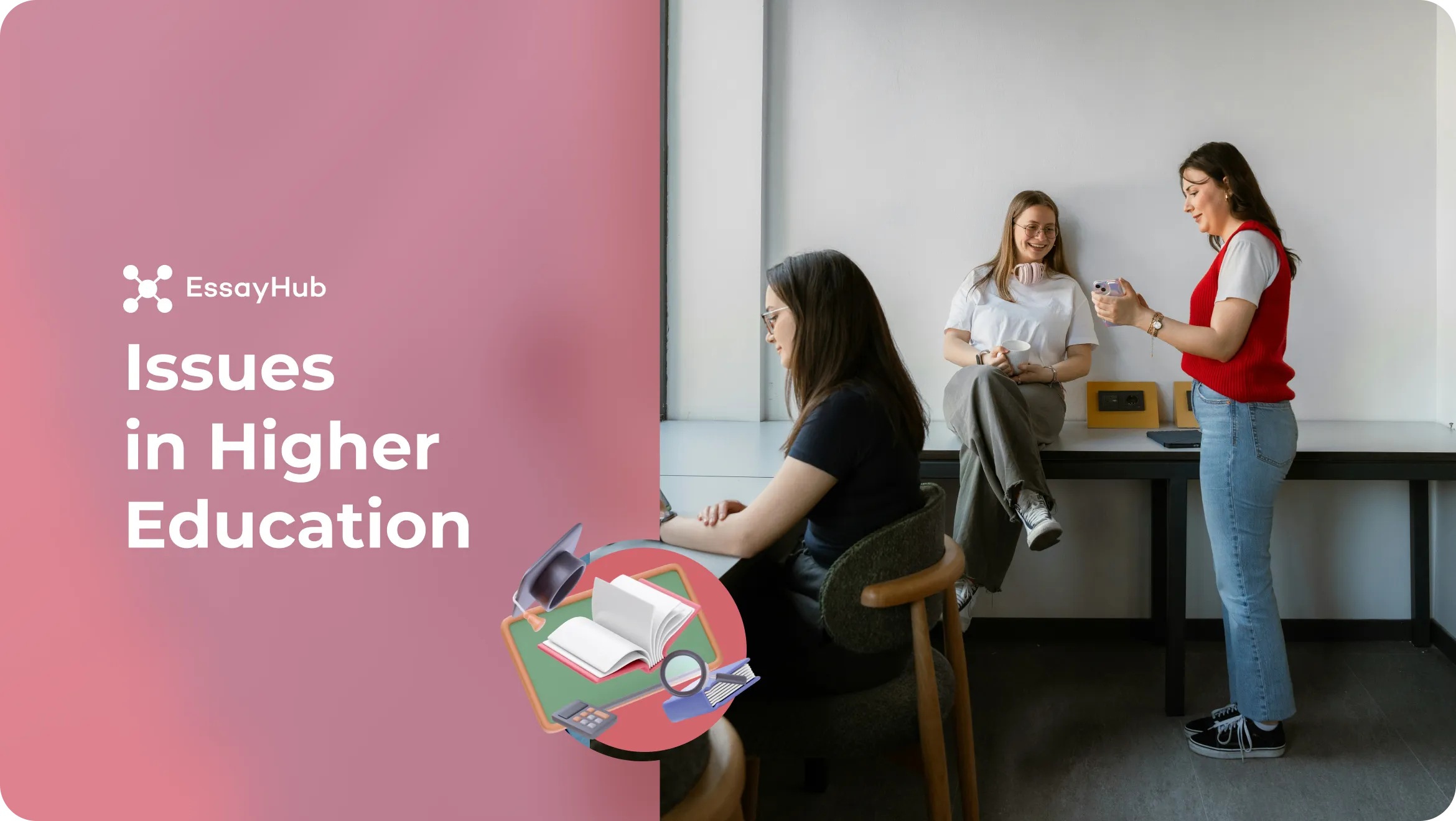College students can find books to read across many areas, from philosophy and literature to psychology and social thought. Recommended titles include The Brothers Karamazov, Man’s Search for Meaning, Brave New World, The Grapes of Wrath, and The Master and Margarita. As Jordan Peterson put it, classics offer commentary that transcends time. They also expose you to other perspectives that enrich your worldview.
For students working on personal growth and study focus, books like Flow and Thinking, Fast and Slow offer practical insight into attention, motivation, and the way the mind learns. So, what are the books every college student should read? We decided to start with Jordan Peterson's list and add our own selection of titles to it.
4 Reasons Why Students Should Read More
A student reading a book on their own is always a good thing to see, but are there any real benefits to it? Books won't just make for a good pastime, but will also:
- Develop your critical thinking skills. Both fiction and non-fiction titles train your metaphorical analytical thinking muscles. Some books also teach you to build solid arguments based on logical reasoning.
- Help you understand human nature. The titles listed below will give you valuable insights into what drives human behavior. These very insights are crucial for a deeper understanding of the challenges of adult life and personal growth.
- Improve your vocabulary and writing skills. You might shy away from complicated books for simpler narratives and vocabulary. Yet, you need to engage with these texts to become a better writer.
- Prepare you for your future career. Philosophy and literature titles on this list make for a great introduction to ethics. Interpersonal, writing, and communication skills that reading gives us are also valuable in professional life.
13 Must Read Books For College Students
Books shape the way you think far more than any lecture ever will. They give you distance from your own habits and show how human minds have found meaning across time. The book recommendations for college students below ask questions that never really stop mattering.
- The Brothers Karamazov by Fyodor Dostoevsky exposes the moral and spiritual anatomy of the human being.
- Archetypes and the Collective Unconscious by Carl Jung maps the symbolic and unconscious structure behind that anatomy.
- Viktor Frankl's Man's Search for Meaning provides the existential response, showing how one lives with it.
1. The Brothers Karamazov by Fyodor Dostoevsky (1880)
This is the story of three brothers bound by blood but divided by conviction. Their father's murder becomes the stage where all three collide. Through them, Dostoevsky dissects conscience and guilt as if they were living organisms.
Famous line: "If God is dead, everything is permitted."
2. Archetypes and the Collective Unconscious by Carl Jung (1959)
Jung believed the mind holds more than private memories. Beneath the surface, he saw a deeper structure shared by everyone, a hidden architecture made of repeating symbols. He called these forms archetypes. They rise uninvited in dreams and myths from every culture and era. By tracing them, Jung showed that identity grows from something older than the self.
Famous line: "Who looks outside, dreams; who looks inside, awakes."
3. Man's Search for Meaning by Viktor Frankl (1946)
Frankl describes the camps with a clarity that refuses sentimentality. He watched men lose hope and fade, while others survived through a sense of purpose that no guard could take. Out of that observation came logotherapy, his approach to healing through meaning rather than comfort. The book is a record of endurance and also a study of how meaning becomes a form of survival.
Famous line: "Those who have a why to live can bear almost any how."
4. 1984 by George Orwell (1949)
Orwell built a world where words rot before they reach your mouth. History bends each morning to fit the ruling mood. Memory becomes a crime. At its center stands Winston Smith, a man who tries to stay human while the air around him turns poisonous with lies. The book tells us about how truth erodes when language stops meaning anything.
Famous line: "Big Brother is watching you."
5. Brave New World by Aldous Huxley (1932)
Huxley pictured a world that feels happy on the surface, where people are designed to smile on command and never question why. Pain has been erased, yet so has the private voice that asks what life is for. The result is a glittering emptiness. Each time technology makes life smoother, his warning grows louder: comfort without thought is control.
Famous line: "Words can be like X-rays if you use them properly."
6. To Kill a Mockingbird by Harper Lee (1960)
Lee filters the world through a child's clear but unguarded gaze. In that quiet town, fairness depends on skin color, and decency costs more than most are willing to pay. Empathy, Lee suggests, is not a soft virtue but moral work.
Famous line: "You never really understand a person until you consider things from his point of view."
7. The Value of Everything by Mariana Mazzucato (2018)
Mazzucato takes aim at the stories economies tell about themselves. She draws a hard line between those who make things and those who profit from moving numbers around. Her call is simple but sharp: remember who actually builds and teaches. For anyone studying economics, the book forces a reexamination of what productivity and progress really mean.
Famous line: "When we confuse price with value, we get a distorted view of the economy."
8. The Denial of Death by Ernest Becker (1973)
Becker starts with a blunt premise: everything we build is a distraction from death. He traces how people chase fame and control, not for glory, but for shelter from that knowledge. The patterns look noble on the surface and terrified underneath. His argument exposes the bargain we all make with fear.
Famous line: "The irony of man's condition is that the deepest need is to be free of the anxiety of death and yet it is life itself which awakens it."
9. The Grapes of Wrath by John Steinbeck (1939)
Steinbeck follows the Joads as they chase the faint promise of work out West. Along the road, hunger strips away pride. The story doesn't moralize; it bears witness. Through the dust and exhaustion, Steinbeck captures how poverty tests what's left of dignity and how endurance itself turns into a form of protest.
Famous line: "Wherever there's a fight so hungry people can eat, I'll be there."
10. The Gulag Archipelago by Aleksandr Solzhenitsyn (1973)
Solzhenitsyn writes from memory carved by frost and hunger. He gathers voices from the camps and arranges them into an indictment no government could erase. Each account shows how conviction mutates into cruelty when ideology eclipses mercy. The book is history written with moral intent, proof that truth survives even when its witnesses are meant to disappear.
Famous line: "The line dividing good and evil cuts through the heart of every human being."
11. The Trial by Franz Kafka (1925)
Kafka drops the reader into a world where guilt exists without reason. Josef K. wakes one morning to find himself accused of a crime that no one can name. His search for an explanation leads only to deeper absurdity, where every corridor ends in another closed door. The novel captures the terror of modern bureaucracy and the helplessness of a man lost inside it.
Famous line: “Someone must have been telling lies about Josef K., he knew he had done nothing wrong but, one morning, he was arrested.”
12. The Stranger by Albert Camus (1942)
Camus writes about a man who refuses to fake emotion even when the world demands it. His calm detachment makes ordinary events feel foreign and stripped of meaning. The book reads like a test of honesty: how much truth can a person endure before society calls it madness? It remains the clearest expression of Camus’s idea that life has no script except the one you choose.
Famous line: “I opened myself to the gentle indifference of the world.”
13. The Road to Serfdom by Friedrich Hayek (1944)
Hayek’s warning feels both historical and current. He argues that when governments try to manage every detail of economic life, freedom erodes step by step, often in the name of safety. The book is written with urgency by someone who watched Europe lose itself to ideology. His point is blunt: once control becomes habit, liberty fades without anyone noticing.
Famous line: “Emergencies have always been the pretext on which the safeguards of individual liberty have been eroded.”
Books for College Students About Psychology and Psychiatry
Some psychology-related books college students should read encourage you to slow down and think. Each thinker follows a different path toward the same question: what makes a person whole. Freud looks inward through dreams, Jung searches for meaning in symbols, and Rogers focuses on empathy and growth. Together, the books below show that psychology is a mirror held to human nature and mental health.
- An Outline of Psychoanalysis by Sigmund Freud
- The Interpretation of Dreams by Sigmund Freud
- Aion by Carl Jung
- Answer to Job by Carl Jung
- Modern Man in Search of a Soul by Carl Jung
- Psychology and Alchemy by Carl Jung
- Symbols of Transformation by Carl Jung
- Two Essays on Analytical Psychology by Carl Jung
- Archetypes of the Collective Unconscious by Carl Jung
- The Great Mother by Erich Neumann
- The Origins and History of Consciousness by Erich Neumann
- Existence: A New Dimension in Psychiatry and Psychology by Rollo May, Ernest Angel, and Henri Ellenberger
- On Becoming a Person by Carl Rogers
- A Way of Being by Carl Rogers
- Life at the Bottom by Theodore Dalrymple
- Our Culture: What’s Left of It by Theodore Dalrymple
- Genius by Hans Eysenck
- Play, Dreams and Imitation in Childhood by Jean Piaget
- The Moral Judgment of the Child by Jean Piaget
- The Discovery of the Unconscious by Henri Ellenberger
Neuroscience Books for College Students
The brain is a living system that explains thought through structure and motion. Each author of these must read books for college students begins from the same place: the space between neurons and behavior. Writers like Oliver Sacks and Joseph LeDoux turn science into story to show us how the brain gives shape to emotion and self.
- An Ecological Approach to Visual Perception by James J. Gibson
- The New Executive Brain by Elkhonon Goldberg
- The Neuropsychology of Anxiety by Jeffrey Gray and Neil McNaughton
- The Emotional Brain by Joseph LeDoux
- Affective Neuroscience by Jaak Panksepp
- The Man Who Mistook His Wife for a Hat by Oliver Sacks
- Awakenings by Oliver Sacks
- An Anthropologist on Mars by Oliver Sacks
- Brain Architecture: Understanding the Basic Plan by Larry Swanson
- The Working Brain by A.R. Luria
- The Brain That Changes Itself by Norman Doidge
- Synaptic Self by Joseph LeDoux
- Musicophilia by Oliver Sacks
- Phantoms in the Brain by V.S. Ramachandran and Sandra Blakeslee
- The Feeling of What Happens by Antonio Damasio
- Incognito: The Secret Lives of the Brain by David Eagleman
- Consciousness Explained by Daniel Dennett
- Brainstorms by Daniel Dennett
- The Tell-Tale Brain by V.S. Ramachandran
- The Human Brain Book by Rita Carter
Books About Religion All College Students Should Read
Some popular books for college students turn belief into study and show how faith evolves through culture. They trace how ancient stories became sacred texts and how rituals turn into systems of order. Reading them reveals how myth, psychology, and art speak the same language of meaning. Authors such as Mircea Eliade and Huston Smith approach religion as a key to understanding how civilizations make sense of existence.
- A History of Religious Ideas Vol. 1 by Mircea Eliade
- A History of Religious Ideas Vol. 2 by Mircea Eliade
- A History of Religious Ideas Vol. 3 by Mircea Eliade
- Myth and Reality by Mircea Eliade
- Myths, Dreams and Mysteries by Mircea Eliade
- Shamanism: Archaic Techniques of Ecstasy by Mircea Eliade
- The Forge and the Crucible by Mircea Eliade
- The Sacred and the Profane by Mircea Eliade
- The Great Code by Northrop Frye
- Words with Power by Northrop Frye
- The Crisis of Islam by Bernard Lewis
- The World’s Religions by Huston Smith
- Mephistopheles: The Devil in the Modern World by Jeffrey Burton Russell
- The Bible: Designed to be Read as Living Literature
- The Symbolic Life by Carl Jung
- Psychology of Religion: East and West by Carl Jung
- Psychology: East and West by Carl Jung
- Mysterium Coniunctionis by Carl Jung
- Archetypes and the Collective Unconscious by Carl Jung
- Aion by Carl Jung
Books About History for College Students
Some of the top books for college students remind you that history is not a line. It is a series of experiments, each one testing how humans organize power and knowledge. These works by authors like Steven Pinker, Angus Deaton, and William Shirer examine how progress is built and often undone. They connect ideas to people and show how progress depends on evidence more than optimism. Reading them changes how you see every institution that claims to be permanent.
- Little Science, Big Science by Derek J. de Solla Price
- The Mystery of Capital by Hernando de Soto
- Systemantics: How Systems Work and Especially How They Fail by John Gall
- The Rise of Statistical Thinking 1820–1900 by Theodore M. Porter
- Stalin: The First In-depth Biography by Edvard Radzinsky
- The Rise and Fall of the Third Reich by William L. Shirer
- The Great Escape by Angus Deaton
- How to Spend $75 Billion to Make the World a Better Place by Bjorn Lomborg
- Progress: Ten Reasons to Look Forward to the Future by Johan Norberg
- Enlightenment Now: The Case for Reason, Science, Humanism, and Progress by Steven Pinker
- The Rational Optimist: How Prosperity Evolves by Matt Ridley
- Factfulness by Hans Rosling
- Earth in Human Hands by David Grinspoon
- I, Claudius by Robert Graves
- Tolstoy by Henri Troyat
- The Charterhouse of Parma by Stendhal
- The Red and the Black by Stendhal
- The Master and Margarita by Mikhail Bulgakov
- Lord of the Flies by William Golding
- Fear and Loathing in Las Vegas by Hunter S. Thompson
Final Thoughts
You might think books are a thing of the past. Why spend hours when AI tools can sum up anything in a matter of seconds? Still, reading remains very much a marker of intelligence and analytical thinking.
And if you need an extra reason to get into another must-read book in your free time, the books we've talked about will broaden (perhaps even change!) your worldview. Does academic workload leave no time to spare for leisurely reading? EssayHub's experts can take a couple of assignments off your plate. With vetted specialists across 100+ subjects, no assignment is too complicated for us!
FAQ
What Books Should College Students Read to Understand Religion?
To study religion is to study the mind's need for meaning. Each title below approaches the sacred from a different door.
- The Varieties of Religious Experience by William James
- The Hero with a Thousand Faces by Joseph Campbell
- The World's Religions by Huston Smith
What Neuroscience Books Should College Students Read?
Neuroscience turns abstract wonder into anatomy. The stories of these writers make biology feel personal, as if the brain itself were trying to understand itself.
- The Tell-Tale Brain by V.S. Ramachandran
- The Brain That Changes Itself by Norman Doidge
- Descartes' Error by Antonio Damasio
What Books About Psychology Should College Students Read?
History becomes vivid when told by those who witnessed it. Here are essential titles often assigned in college:
- Thinking, Fast and Slow by Daniel Kahneman
- Flow by Mihaly Csikszentmihalyi
- The Road Less Traveled by M. Scott Peck
What History Books Do College Teachers Assign Students?
A few books arrive at the right moment and change how you think. Every student should encounter at least one of these:
- The Guns of August by Barbara W. Tuchman
- A People's History of the United States by Howard Zinn
- Postwar by Tony Judt
What Are Some Life-Changing Books for College Students?
A few books reach you at the right time and change how you think. Every student should meet at least one of these:
- The Alchemist by Paulo Coelho
- Meditations by Marcus Aurelius
- Letters to a Young Poet by Rainer Maria Rilke
- SKUENN. (2012, March 2). Outstanding Books for the College Bound. Young Adult Library Services Association (YALSA). https://www.ala.org/yalsa/outstanding-books-college-bound
- Covel, C. (2024, October 2). 10 Classic Literature Novels To Read in College. Splash of the Titans Blog | Eastern Florida State College. https://blog.easternflorida.edu/classic-literature-must-reads-for-college-students/
- First-Year Experience Books and All-School Reads — Harvard University Press. (2023). Harvard University Press. https://www.hup.harvard.edu/features/the-first-year-experience






